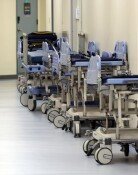Japanese remain considerate in quake`s aftermath
Japanese remain considerate in quake`s aftermath
Posted March. 15, 2011 10:06,
A Dong-A Ilbo reporter arrived at Fukushima Airport in Japan Saturday to cover the massive earthquake that struck northeastern Japan Friday. He met three Japanese who were considerate and warm-hearted.
Hiroshi Egawa, a 25-year-old taxi driver in the coastal city of Sendai in Miyagi Prefecture, was heading for Sendai at 3 p.m. Saturday from Fukushima. He took the national highway because the expressway was blocked.
Evening soon arrived and he looked for stores to buy something to eat. Most stores were closed, however, and even those that were open had run out of food. The situation was more severe as he neared Sendai, where even ice cream was unavailable.
No restaurants were open. The reporter expressed regret for bringing no food from Korea. Egawa then saw the reporter and drove him to his home in Sendai. He gave the reporter a plastic bag filled with things to eat, saying, Im sorry I have no rice left, and so I brought bread, snacks and water.
The reporter said he was exhausted after traveling six hours from Fukushima to Sendai, but soon recovered thanks to Egawas hospitality.
The reporter also met Yuiko Seno, 28, at Higashi-Kokubun Junior High School, a temporary shelter in Sendai, after looking for temporary shelters immediately after arriving at Sendai at 10 p.m. Saturday. The shelter was dark because electricity was shut down.
Seno was pacing around the school and guided the reporter around the place. Seno initially seemed like a city official but later said he was pursuing a doctorate at Tohoku University and had been evacuated to the shelter.
I have no particular schedule tomorrow. Ill guide you around Sendai if you want, he said.
The reporter saw Seno again at 9 a.m. Sunday at the shelter, and they went around the coastal village of Arahama, where 300 people were discovered dead. Thanks to Seno`s sincerity, the reporter interviewed a Japanese who had been directly affected by the earthquake.
The third Japanese the reporter met was Sayaka Sato, 31, who was working at Prince Hotel where the reporter checked in late Saturday night. The reporter could not find a place to stay after moving around since arriving in Sendai that day.
Hotels were not receiving guests because of a series of aftershocks from the earthquake. The reporter at midnight made a desperate attempt to find accommodation and went to Prince Hotel.
Ill give a room to a Korean reporter. The Japanese people will manage to find a place to sleep but I know how difficult it is for Koreans visiting here, Sato said, who asked the reporter to inform Koreans about Japans dire situation.
Sato photocopied maps of the damaged area and explained its condition to the reporter. When asked to act as a guide in Oganawa, a township in Miyagi Prefecture where more than 10,000 people were found missing, she asked the reporter not to go there by saying, That place is dangerous not only because it is a coastal area but also because there is a nuclear plant there. It is vulnerable to accidents because of aftershocks of the quake.
The reporter said he was deeply inspired by Satos thoughtfulness even as she was suffering from one of the most devastating disasters in Japans history.
lovesong@donga.com







